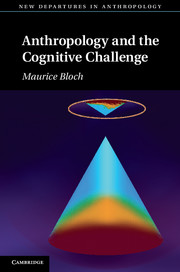Book contents
- Frontmatter
- Contents
- Acknowledgements
- 1 Why anthropologists cannot avoid cognitive issues and what they gain from these
- 2 Innateness and social scientists' fears
- 3 How anthropology abandoned a naturalist epistemology: a cognitive perspective on the history of anthropology
- 4 The nature/culture wars
- 5 Time and the anthropologists
- 6 Reconciling social science and cognitive science notions of the ‘self ’
- 7 What goes without saying
- 8 Memory
- References
- Index
3 - How anthropology abandoned a naturalist epistemology: a cognitive perspective on the history of anthropology
Published online by Cambridge University Press: 05 August 2012
- Frontmatter
- Contents
- Acknowledgements
- 1 Why anthropologists cannot avoid cognitive issues and what they gain from these
- 2 Innateness and social scientists' fears
- 3 How anthropology abandoned a naturalist epistemology: a cognitive perspective on the history of anthropology
- 4 The nature/culture wars
- 5 Time and the anthropologists
- 6 Reconciling social science and cognitive science notions of the ‘self ’
- 7 What goes without saying
- 8 Memory
- References
- Index
Summary
The purpose of this chapter is to show in more detail how the history of social and cultural anthropology has always involved suppositions and implicit theories about the nature of human mental processes whether the practitioners of these disciplines are aware of this and whether they like the idea or not. This involvement of anthropology with psychological issues is as true of periods when cultural and social anthropologists were most hostile to natural science as when they saw their subject as part of it. Because these largely implicit theories underpin all work in the anthropological disciplines, the effect of not examining them critically is that it leaves us at the mercy of their subterranean determinations.
Probably the most damaging legacy of the lack of examination of the implicit psychological underpinnings of social and cultural anthropology has been that it has transformed what should have been a fruitful controversy about the effects of the specialisation of the human brain on history into a highly misleading and sterile one about whether humans were to be seen as either ‘cultural’ or ‘natural’ beings. This opposition still haunts the discipline. What follows is an explanation how this has come about, how it has damaged theoretical reflection and how it can be avoided.
- Type
- Chapter
- Information
- Anthropology and the Cognitive Challenge , pp. 24 - 43Publisher: Cambridge University PressPrint publication year: 2012



